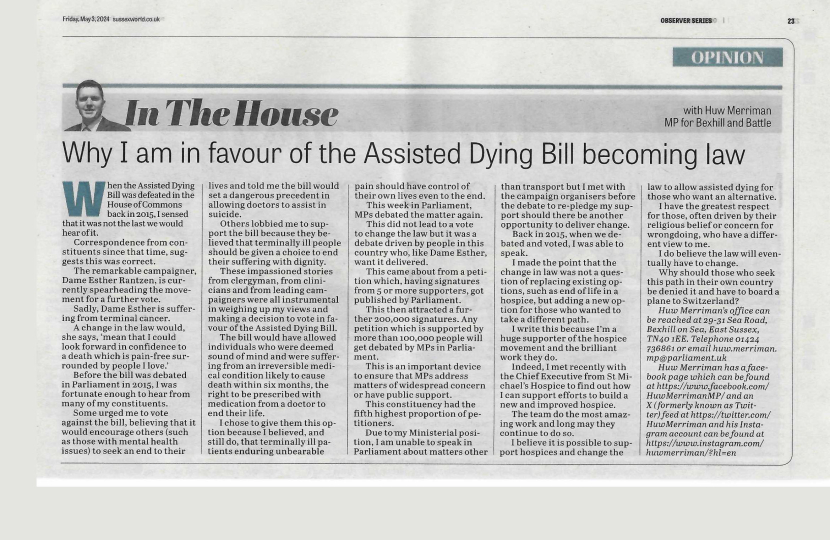
When the Assisted Dying Bill was defeated in the House of Commons back in 2015, I sensed that it was not the last we would hear of it. Correspondence from constituents since that time, suggests this was correct.
The remarkable campaigner, Dame Esther Rantzen, is currently spearheading the movement for a further vote. Sadly, Dame Esther is suffering from terminal cancer. A change in the law would, she says, ‘mean that I could look forward in confidence to a death which is pain-free surrounded by people I love.’
Before the bill was debated in Parliament in 2015, I was fortunate enough to hear from many of my constituents. Some urged me to vote against the bill, believing that it would encourage others (such as those with mental health issues) to seek an end to their lives and told me the bill would set a dangerous precedent in allowing doctors to assist in suicide. Others lobbied me to support the bill because they believed that terminally ill people should be given a choice to end their suffering with dignity.
These impassioned stories from clergyman, from clinicians and from leading campaigners were all instrumental in weighing up my views and making a decision to vote in favour of the Assisted Dying Bill. The bill would have allowed individuals who were deemed sound of mind and were suffering from an irreversible medical condition likely to cause death within six months, the right to be prescribed with medication from a doctor to end their life. I chose to give them this option because I believed, and still do, that terminally ill patients enduring unbearable pain should have control of their own lives even to the end.
This week in Parliament, MPs debated the matter again. This did not lead to a vote to change the law but it was a debate driven by people in this country who, like Dame Esther, want it delivered. This came about from a petition which, having more than 5 signatures, got published by Parliament. This then attracted a further 200,000 signatures. Any petition which is supported by more than 100,000 people will get debated by MPs in Parliament. This is an important device to ensure that MPs address matters of widespread concern or have public support.
This constituency had the fifth highest proportion of petitioners. Due to my Ministerial position, I am unable to speak in Parliament about matters other than transport but I met with the campaign organisers before the debate to re-pledge my support should there be another opportunity to deliver change.
Back in 2015, when we debated and voted, I was able to speak. I made the point that the change in law was not a question of replacing existing options, such as end of life in a hospice, but adding a new option for those who wanted to take a different path. I write this because I’m a huge supporter of the hospice movement and the brilliant work they do. Indeed, I met recently with the Chief Executive from St Michael’s Hospice to find out how I can support efforts to build a new and improved hospice. The team do the most amazing work and long may they continue to do so.
I believe it is possible to support hospices and change the law to allow assisted dying for those who want an alternative. I have the greatest respect for those, often driven by their religious belief or concern for wrongdoing, who have a different view to me. I do believe the law will eventually have to change. Why should those who seek this path in their own country be denied it and have to board a plane to Switzerland?



